Charlie Daniel was called a lot of things during more than six decades as a newspaper cartoonist in Knoxville, Tennessee.
Some of the names are unprintable. Others are just amusing.
“I got some letters and emails over the years saying, ‘Why don’t you quit?’” says Daniel, 90, a lifelong Baptist and Marine Corps veteran unafraid of skewering politicians, causes and even the coronavirus with his drawings.
The hall-of-fame editorial cartoonist did eventually retire in February 2019 at age 89, leaving him with only one nickname that puzzles him: “the gentle eviscerator.”
Daniel admits the term bestowed on him by a writer perplexes him.
“I’m still looking up ‘eviscerator,’” he says with a laugh during an interview at his Knoxville home earlier this year. “Once I figure that out, then I’ll comment on that.”
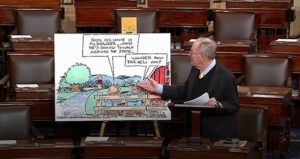
U.S. Sen. Lamar Alexander explains a Charlie Daniel drawing on the floor of the U.S. Senate. (Photo/Sen. Lamar Alexander)
But there are plenty of others lining up to comment on that. Family members, ministers, civic leaders, politicians are eager for a chance to explain why the moniker fits – and why it’s a term of endearment.
They describe a man whose sharp wit and humorous, original drawing style is filtered through a compassion born of faith and an easy-going personality.
“He can criticize you and do it in a way that was is civilized,” says U.S. Sen. Lamar Alexander, a Tennessee Republican who was often the butt of Daniel’s cartoons. “Even when he was poking at me, he would do it in a gentle way.”
Daniel was unafraid to take aim at politicians and other leaders, regardless of influence and public endearment, Alexander and others say. A few years back, he even jabbed at Harry Moskos, then-editor of the rival Knoxville News-Sentinel newspaper.
“And I loved it,” says Moskos, who would later hire Daniel when the Knoxville Journal closed in 1992. “It shows that you can disagree with somebody but be cordial.”
‘You don’t come across as mean’
Drawing cartoons on dicey political topics without being ugly just comes naturally, says Daniel, who was born in Richmond, Virginia. But he’s uncomfortable attributing it to piety, as some others do.
“Faith is my foundation, but I never went into drawing a cartoon saying, ‘how’s that going to balance with my belief in Jesus?’ and all that,” he says. “That’s just built in and I never really thought about it.”
The faith influence behind Daniel’s drawings may be more apparent to others.
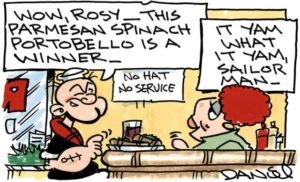
A panel from Daniel’s popular comic strip, “Rosy’s Diner.” (Image/Courtesy of Charlie Daniel)
“I see him trying to evidence the mind of Christ. He’s servant oriented,” says Bob Hall, former director of the Baptist Collegiate Ministry at the University of Tennessee and Daniel’s Sunday school teacher at First Baptist Church in downtown Knoxville.
Daniel gives freely of himself to those in need, Hall says. Never stingy with his time, Daniel regularly addresses student groups on campus, entertains hospitalized children and displays an abiding concern for homeless people.
No wonder Daniel wasn’t mean spirited in his newspaper drawings, Hall says.
“When you are that way in your heart, you don’t come across as mean.”
‘We had to memorize scripture’
Patsy Daniel guesses her husband can’t readily see the spirituality in his work because his faith was instilled “from the get-go” in a rock-solid Christian home in Weldon, North Carolina, where he was raised.
“His family have always been very strong Baptists,” she says. “He just grew up that way.”
That upbringing wasn’t only Baptist, but also progressive.
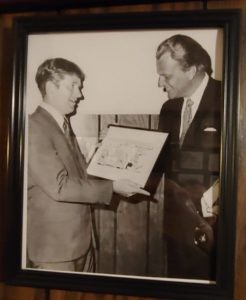
Daniel presents a drawing to Billy Graham during the evangelist’s 1970 crusade in Knoxville, Tenn.
“People would probably call it liberal these days,” Daniel adds.
His father was a deacon at Weldon Baptist Church and so was his mother, an uncommon role for Baptist women at that time. But Weldon’s members didn’t think twice about a woman in leadership, Daniel recalls.
“It was biblical, for Pete’s sake.”
Naturally, the family was always at church and Daniel says he couldn’t help but become infused with a compassionate Baptist Christianity.
“It was osmosis.My father was a Sunday school teacher. My mother eventually became the choir director.”
He and church friends were doing Bible sword drills before they were called sword drills, he adds.
“We had to memorize scripture.”
‘Did you set that up?’
There were other influences – powerful ones like football coaches and military drill instructors.
Always athletic growing up, Daniel was a high school football star who was highly recruited by colleges.
“I had 11 scholarship offers,” he says. “I visited Tennessee, Clemson, Georgia Tech, Furman, the University of Richmond, Wake Forest and North Carolina.”
Growing up in the Tar Heel State, however, cinched it. He went on to start at the University of North Carolina his freshman year.
But the Korean conflict was raging, and soon Uncle Sam started calling the plays for Daniel. He entered the Marine Corps and trained for the infantry but narrowly missed going to Korea – a fact his prayerful family back home saw as divine intervention.
“Oh yes, we all think that,” Patsy says.
Daniel struggles with that conclusion, however, saying it overlooks why so many others suffered because of the war. His best friend died in Korea.
“They certainly believe in divine intervention,” he says of the family. “But I just don’t know. I’ll ask the Lord later on, ‘Did you set that up?’”
‘I developed my own style’
Daniel returned to UNC after his discharge from the Marines, but football was no longer in the cards for him.
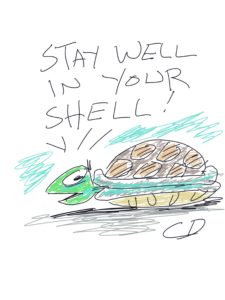
During the COVID-19 pandemic, Daniel has used his drawings to promote public safety. (Image/Charlie Daniel)
“The other players were bigger and faster and meaner, so that was the end of my football stuff.”
His coursework wasn’t any more promising.
“I was studying accounting and in way over my head,” he says.
Then a neighbor, who worked for the college newspaper, noticed Daniel was always sketching.
“He saw these doodles I was drawing. I just drew cartoons for my own entertainment.”
The neighbor connected Daniel with the editor, who liked what he saw. That was in 1955, and he was off on a new career track.
“Originally, my editorial cartoons were a rip off of other editorial cartoonists,” he says. “Slowly I developed my own style, which was more of a comic-strip style.”
That style did not include attacking people.
“I never liked that; it wasn’t my nature,” he says. “I felt like I was more of a humorist, and humorists make you laugh and also think.”
‘The best editorial cartoons’
After a lot of rejections – Daniel keeps a huge binder full of those letters – he landed a job at the Knoxville Journal in 1958. He found his niche there and developed a fan following with his drawings about sports and politics.
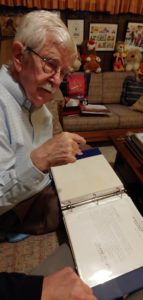
In his home, Daniel shares a scrap book filled with rejection letters from the 1950s. (Photo/Jeff Brumley)
When that paper closed, he was hired on at the News-Sentinel where he worked more than 25 years until his retirement.
Along the way, he ventured into side comic strip projects.
And he’s shown far too much humility along the way, says Ed Gamble, a syndicated editorial cartoonist who has collaborated with Daniel and formerly drew for The Florida Times-Union in Jacksonville, Florida.
“His characters and words were always so much funnier compared to other (editorial) cartoonists.”
Gamble grew up near Knoxville and was inspired by Daniel’s humorous characters and dialogue.
“The way it looks is funny and the way it reads is funny,” he says.
Even those who disliked Daniel’s work usually found find it amusing, he adds.
“They read him for 60 years and saw what a good guy he is.”
Those qualities convinced Moskos to hire Daniel when he had the chance.
“His were the best editorial cartoons I have ever seen,” he says.
‘These are historic times’
Newspaper readers haven been sole beneficiaries of Daniel’s witty drawings over the years, said Bruce Spangler, CEO of the Volunteer Ministry Center, a Knoxville non-profit dedicated to ending and preventing homelessness.
Daniel has been involved with the center for close to 25 years, including service as a member and chairman of the board.
Daniel recently presented the ministry a coloring book containing cartoons about University of Tennessee football, some dating back to 1959.
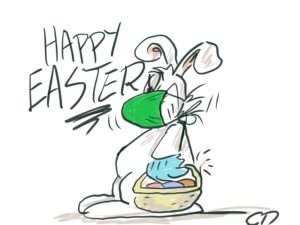
Daniel’s take on Easter in a time of pestilence. (Image/Charlie Daniel)
“He retraced them by hand – 80 of them,” Spangler says. “He called it the Big Orange Coloring Book.”
Daniel is moved to action from his concern for others, Spangler says.
“The thing about Charlie is he wants to be with his neighbors who struggle in his community.For him to turn his back on them would be to turn his back on Jesus.”
It’s why he draws for children in their hospital rooms, Hall adds.
“He uses his skill set to serve.He uses his giftedness to serve.”
Daniel has continued that service in retirement and has found another positive outlet for his drawing during COVID-19 pandemic: drawing and publishing cartoons urging readers to take safety precautions to stay healthy.
“Sometimes I wish I was still working,” he says. “These are historic times.”
